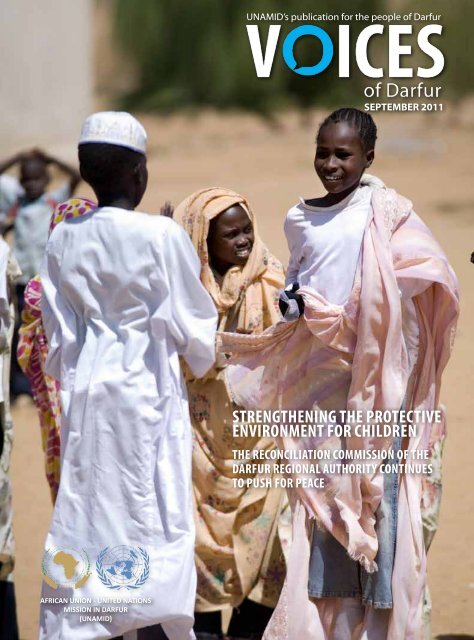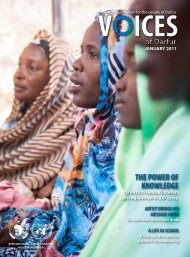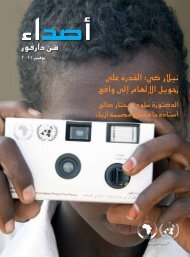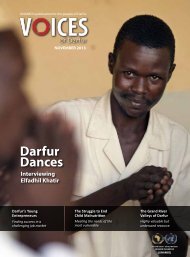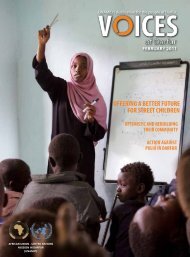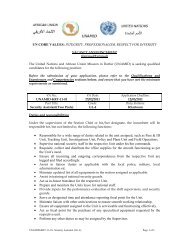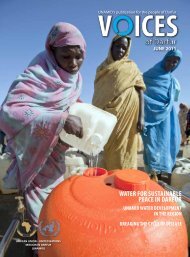strengthening the protective environment foR children
English - Unamid
English - Unamid
- No tags were found...
You also want an ePaper? Increase the reach of your titles
YUMPU automatically turns print PDFs into web optimized ePapers that Google loves.
UNAMID’s publication for <strong>the</strong> people of Darfur<br />
SEPTEMBER 2011<br />
<strong>streng<strong>the</strong>ning</strong> <strong>the</strong> <strong>protective</strong><br />
<strong>environment</strong> <strong>foR</strong> <strong>children</strong><br />
The Reconciliation Commission of <strong>the</strong><br />
Darfur Regional Authority continues<br />
to push for peace<br />
AFRICAN UNION - UNITED NATIONS<br />
MISSION IN DARFUR<br />
(UNAMID)
COMMUNTY<br />
Darfuri women sing for peace<br />
BY daniel adekera<br />
Hakkamat singers perform at a UNAMID sponsored event in<br />
Nyala, South Darfur<br />
PHOTOS OLIVIER CHASSOT<br />
Traditional songs and poetry have<br />
always formed an integral part of <strong>the</strong><br />
rich African cultural heritage. People<br />
who are gifted in <strong>the</strong> art of composing are<br />
venerated by <strong>the</strong> society as custodians<br />
and preservers of a community’s history,<br />
often reciting acts of bravery and victories<br />
in battles.<br />
Darfur, a region which has experienced<br />
numerous localized conflicts in <strong>the</strong><br />
past, has singers known as Hakkamat.<br />
These women sing at important local<br />
occasions such as cultural festivals,<br />
visits of dignitaries or <strong>the</strong> coronation<br />
of a traditional ruler. The presence and<br />
performances by Hakkamat singers at any<br />
occasion automatically accords <strong>the</strong> event<br />
a high status.<br />
They are found predominantly in <strong>the</strong> South<br />
Darfur and Kordofan areas, although each<br />
community boasts of its Hakkamat singers.<br />
Presently, in South Darfur, over 60 groups<br />
are registered with <strong>the</strong> general association<br />
for local arts and heritage. Their traditional<br />
costumes reflect <strong>the</strong> type of occasion<br />
in which <strong>the</strong>y are participating. These<br />
range from simple to heavily ornamented<br />
dresses, which signify <strong>the</strong> status of <strong>the</strong><br />
particular Hakkamat group. Their poetry<br />
and songs, which could be situational or<br />
event-specific, mainly focus on conflict, an<br />
explanation of <strong>the</strong> prevalence of so many<br />
Hakkamat groups in <strong>the</strong> war-torn region<br />
of Darfur.<br />
Because of <strong>the</strong> influence of Hakkamat<br />
singers on <strong>the</strong> society, it is widely believed<br />
that <strong>the</strong>y have fuelled localized conflicts in<br />
Darfur in <strong>the</strong> past as <strong>the</strong>y have traditionally<br />
specialized in eulogizing <strong>the</strong> bravery<br />
of <strong>the</strong> combatants and urging <strong>the</strong>m to<br />
exploit this by defeating <strong>the</strong>ir enemies.<br />
The singers chronicled <strong>the</strong> great battles<br />
fought and won by <strong>the</strong>ir forefa<strong>the</strong>rs and<br />
asked rhetorically whe<strong>the</strong>r such acts<br />
of bravery had been buried with <strong>the</strong>ir<br />
ancestors. Sometimes <strong>the</strong>y insinuated in<br />
<strong>the</strong>ir poetry that all ‘men’ in <strong>the</strong> community<br />
had died, leaving only ‘women’, which is<br />
why ano<strong>the</strong>r community had come to<br />
provoke <strong>the</strong>m. If <strong>the</strong> men wanted to prove<br />
that <strong>the</strong>y were manly, <strong>the</strong>n <strong>the</strong>y would<br />
have to fight off <strong>the</strong> invaders.<br />
But, those were earlier days when meeting<br />
violence with violence was celebrated as a<br />
virtue. Things have changed dramatically<br />
in Darfur since <strong>the</strong> search for sustainable<br />
peace and security began.<br />
According to Huda Rahmaullah, one of <strong>the</strong><br />
famous Hakkamat singers residing in Nyala,<br />
South Darfur, “<strong>the</strong> music has changed, and<br />
so we have also changed our dancing<br />
steps.” This change is connected with <strong>the</strong><br />
clarion call by <strong>the</strong> African Union-United<br />
Nations Mission in Darfur (UNAMID) for all<br />
people and organizations in Darfur to join<br />
hands in <strong>the</strong> search for durable peace in<br />
<strong>the</strong> region. The change in tone is also due<br />
to <strong>the</strong> discovery by Hakkamat singers that<br />
<strong>the</strong>ir talents of singing and poetry should<br />
be used as an asset and not a liability to<br />
4 VOICES OF DARFUR
<strong>the</strong> people of Darfur. This simply means<br />
that <strong>the</strong> Hakkamat have now seen reason<br />
to join in <strong>the</strong> search for sustainable peace<br />
and security in Darfur. They are now<br />
“beating <strong>the</strong>ir swords into ploughshares,<br />
and spears into pruning hooks.” Ra<strong>the</strong>r<br />
than singing for war, <strong>the</strong>y have now<br />
chosen to sing for peace. The songs and<br />
poems that once beat war drums have<br />
now become a mobilizing <strong>the</strong>me for<br />
peace and development in Darfur. Old<br />
songs and poems portraying violence as<br />
a virtue to be bequea<strong>the</strong>d to <strong>the</strong> young<br />
generation have now given way to new<br />
ones that promote a culture of peace and<br />
good neighborliness as indices of a decent<br />
society. Fatma Alghali Attigani now sees<br />
<strong>the</strong> Hakkamat singer as “one who sings for<br />
all and advocates for unity”.<br />
For <strong>the</strong> Hakkamat singers, <strong>the</strong> search<br />
for peace in Darfur should have both<br />
short and long-term perspectives.<br />
Consequently, <strong>the</strong> Hakkamat singers are<br />
now mentoring younger ones on how to<br />
use <strong>the</strong>ir talents for <strong>the</strong> benefit of society.<br />
They have invaded schools and religious<br />
organizations, sensitizing and educating<br />
<strong>children</strong> and women to embrace <strong>the</strong><br />
culture of peace and <strong>the</strong>refore resolution<br />
of conflict. They have also contributed<br />
to <strong>the</strong> reconciliation exercises between<br />
<strong>the</strong> different warring groups such as <strong>the</strong><br />
Fallata and Habbania as well as <strong>the</strong> Trajam<br />
and Rizegat tribes in South Darfur. At <strong>the</strong><br />
insistence of <strong>the</strong> native administration,<br />
<strong>the</strong> organizers of a reconciliation exercise,<br />
Hakkamat women singers were brought in<br />
to appeal to warring tribes through <strong>the</strong>ir<br />
songs to “sheath swords and embrace<br />
peace”. The songs pleaded with <strong>the</strong> tribal<br />
leaders to reflect on <strong>the</strong> days when <strong>the</strong>y<br />
all ate from one plate with bonds of intertribal<br />
marriages as an indication that <strong>the</strong>y<br />
had more in common than hatred for one<br />
ano<strong>the</strong>r. The leaders were touched by <strong>the</strong><br />
emotion-laden songs which succeeded<br />
in making <strong>the</strong>m call on <strong>the</strong> youth in <strong>the</strong>ir<br />
various areas to cease hostilities towards<br />
one ano<strong>the</strong>r and embrace negotiations as a<br />
way of settling disputes instead of violence.<br />
“We are singing for peace and we want<br />
to stop people from using arms and<br />
refrain from violence so that everyone can<br />
begin to enjoy <strong>the</strong> benefits of peace and<br />
stability,” announced one of <strong>the</strong> popular<br />
Hakkamat singers.<br />
Recognizing <strong>the</strong> valuable contribution<br />
of Hakkamat singers to <strong>the</strong> search for a<br />
negotiated peace in Darfur, UNAMID has<br />
engaged <strong>the</strong>m in various activities. One<br />
instance was a horse racing competition<br />
sponsored by <strong>the</strong> Mission’s office in<br />
Nyala where Hakkamat singers featured<br />
prominently. Also, several Hakkamat<br />
singers have met with rebel movements<br />
to dissuade <strong>the</strong>m from fighting. This<br />
underscores <strong>the</strong> commitment of <strong>the</strong><br />
Hakkamat singers to turn conflict around<br />
and be builders of <strong>the</strong>ir communities.<br />
Hakkamat singers in Nyala are accompanied by a local musician<br />
VOICES OF DARFUR<br />
5
YOUTH<br />
Darfur’s youth look toward a better future<br />
BY guiomar pau<br />
girls are not allowed to enroll in <strong>the</strong> same<br />
faculties as boys.<br />
Yousra realizes that youth in Darfur have<br />
fewer possibilities to develop <strong>the</strong>mselves<br />
than those in o<strong>the</strong>r parts of <strong>the</strong> world,<br />
especially in <strong>the</strong> education field. “To some<br />
extent, <strong>the</strong> school <strong>environment</strong> is not<br />
conducive. We don’t have libraries, and<br />
<strong>the</strong>re is a lack of teachers, both in terms of<br />
numbers and quality.”<br />
If she had <strong>the</strong> chance to study abroad she<br />
would jump at it but she maintains that after<br />
receiving her education, she would return<br />
to <strong>the</strong> Sudan to serve her country. She is so<br />
proud of it.<br />
“The media have presented a very bad<br />
image of Darfur to <strong>the</strong> world, just <strong>the</strong> killings<br />
and <strong>the</strong> destruction, but Darfur is a beautiful<br />
area. People are kind and I believe that it can<br />
have a bright future. The war is a black spot.<br />
If we manage to clean it, that will be great for<br />
<strong>the</strong> area,” she says<br />
Yousra Suleiman Al-Toum Ahmed<br />
Only 16 years old, Yousra Suleiman<br />
Al-Toum Ahmed is a Sudanese<br />
teenager, exuding <strong>the</strong> potential<br />
of her generation. She wants to become<br />
a journalist, to explain <strong>the</strong> problems that<br />
<strong>children</strong>, youth and students are facing in<br />
Darfur.<br />
“I would like to reflect <strong>the</strong> good talents that<br />
young Darfuris have. They are ambitious,<br />
willing to help <strong>the</strong>mselves and <strong>the</strong>ir families,<br />
but <strong>the</strong> problem is that <strong>the</strong>y lack awareness,”<br />
she notes.<br />
Around <strong>the</strong> world, young people are<br />
planning and hoping for a better future,<br />
while <strong>the</strong>y contribute to transforming <strong>the</strong>ir<br />
reality. In Darfur, where <strong>the</strong> conflict has<br />
undermined <strong>the</strong> optimism of many, <strong>the</strong>y<br />
still believe and dream of a future with more<br />
opportunities for everybody.<br />
From Yousra’s point of view, young people<br />
should have more options, such as capacitybuilding<br />
programmes, and in <strong>the</strong>ir spare<br />
time <strong>the</strong>y should practice hobbies and<br />
upgrade <strong>the</strong>ir skills. They should also “look<br />
to <strong>the</strong> future, not only to <strong>the</strong> present”.<br />
Her engagement with her community<br />
begins at her school, Al Manar, in El Fasher,<br />
PHOTO: ALBERT GONZALEZ FARRAN<br />
North Darfur. She is a member of <strong>the</strong><br />
students union and head of <strong>the</strong> Koranic<br />
association. During breaks between lessons,<br />
both organizations conduct activities for<br />
<strong>the</strong> students, such as meetings and debates<br />
by external lecturers. They also improve<br />
<strong>the</strong> school <strong>environment</strong> by painting walls,<br />
among o<strong>the</strong>r activities and engage in<br />
conflict resolution among students. Yousra<br />
was also a member of <strong>the</strong> North Darfur<br />
youth parliament. In her opinion, it was a<br />
good initiative to improve <strong>the</strong> abilities and<br />
talents of <strong>children</strong> who received training in<br />
parliamentary procedures as well as of rules<br />
and formalities of governance.<br />
Even though Yousra doesn’t want to become<br />
a politician, she says if she were a decisionmaker,<br />
she would establish internet cafes<br />
so youth could have access to computers<br />
and <strong>the</strong> internet, and would open libraries<br />
and organize debates to fill <strong>the</strong> free time of<br />
young people. “These activities would help<br />
to develop <strong>the</strong>ir skills. Children and youth<br />
have too much time off, and this is a real<br />
problem. Many violations are committed by<br />
youth due to this.” She would also construct<br />
sports facilities for girls, as currently, in<br />
Darfur, <strong>the</strong>y only exist for boys. This is not<br />
<strong>the</strong> only discrimination that girls are facing,<br />
she says. At university level, disappointingly,<br />
She is optimistic and hopes that Darfur<br />
will soon live in peace. “The people of<br />
Darfur have to stop war, stop tribal clashes<br />
and collect arms from <strong>the</strong> people.” Yousra<br />
encourages her community to work harder<br />
for development, and set up projects so that<br />
all Sudan could benefit from <strong>the</strong> progress<br />
made. “The only way to <strong>the</strong> development of<br />
<strong>the</strong> region is peVace, not war,” she remarks.<br />
“I believe that <strong>the</strong> presence of UNAMID is a<br />
positive step. Since its arrival, <strong>the</strong> situation is<br />
better in Darfur. UNAMID plays a significant<br />
role.”<br />
Her thoughts are also transformed into<br />
words. She writes poems, and one of<br />
<strong>the</strong>m won <strong>the</strong> Sudanese National School<br />
Competition in 2008. She says that people<br />
should live for art and poetry and put aside<br />
sorrows and grievances.<br />
In 20 years, she imagines herself as a<br />
university graduate, and a good journalist<br />
intent on solving <strong>the</strong> problems of <strong>children</strong><br />
and young people. She would like to have<br />
a big family, although this would not stop<br />
her from continuing with her professional<br />
career. “I want to be a working mo<strong>the</strong>r. I<br />
would like to have a job as a journalist and<br />
take care of my family too,” she says.<br />
Finally, she hopes that “<strong>the</strong>re will be peace<br />
in Darfur -- it will be magnificently beautiful,<br />
free from wars, and <strong>the</strong>re will be no internally<br />
displaced people. The region will not claim<br />
that it is marginalized. People will enjoy life<br />
in Darfur.”<br />
6 VOICES OF DARFUR
PEACE<br />
Internally displaced persons (IDPs) in Darfur<br />
The Reconciliation Commission of <strong>the</strong> Darfur<br />
Regional Authority continues to push for peace<br />
BY Muntasir Sharafadin and Emadeldin Rijal<br />
PHOTO: ALBERT GONZALEZ FARRAN<br />
In an interview with UNAMID Radio, <strong>the</strong><br />
Chairman of Peace and Reconciliation<br />
Commission at <strong>the</strong> Darfur Regional<br />
Authority (DRA) in West Darfur State,<br />
Assad Abdulrahman Bahreldin, outlined<br />
<strong>the</strong> aims of this Commission. The DRA<br />
is a successor of <strong>the</strong> Transitional Darfur<br />
Regional Authority (TDRA) which was<br />
established under <strong>the</strong> Darfur Peace<br />
Agreement signed in Abuja in 2006. The<br />
DRA was established under <strong>the</strong> terms of<br />
last June’s peace talks in Doha.<br />
Among o<strong>the</strong>rs, those aims include<br />
facilitating reconciliation and reestablishing<br />
social relationships between<br />
groups that have been affected by <strong>the</strong><br />
conflict in Darfur.<br />
“Since its establishment, <strong>the</strong> Commission<br />
has been in contact with people in <strong>the</strong>ir<br />
various villages with <strong>the</strong> purpose of<br />
disseminating peace messages. And this<br />
springs from <strong>the</strong> fact that both security<br />
and stability are fundamental needs of<br />
human beings,” said Assad Bahreldin.<br />
The Commission also strives to inculcate<br />
confidence among Darfuris.<br />
In this respect, Mr. Bahreldin hopes that<br />
<strong>the</strong> upcoming period will see a fur<strong>the</strong>r<br />
engagement in peace and development<br />
programmes that could help restore <strong>the</strong><br />
Darfuri population to <strong>the</strong>ir former era<br />
and stressed <strong>the</strong> importance of achieving<br />
peace at <strong>the</strong> grassroots as well as at <strong>the</strong><br />
level of leadership. He also expressed his<br />
hope that <strong>the</strong> terms -- internally displaced<br />
persons (IDPs) and refugees – would one<br />
day be replaced so <strong>the</strong>se persons could<br />
feel a sense of citizenship and enjoy at <strong>the</strong><br />
very least basic human rights according<br />
to international standards. Moreover,<br />
<strong>the</strong> return of <strong>the</strong> IDPs to <strong>the</strong>ir villages<br />
would greatly assist in <strong>the</strong>ir enjoyment<br />
of a normal life in a secure and stable<br />
<strong>environment</strong>.<br />
The Commission had also played a bigger<br />
role in protecting <strong>the</strong> agricultural lands<br />
and crop harvesting in coordination<br />
with official bodies, non-governmental<br />
organizations (NGOs) and <strong>the</strong> native<br />
administrations by establishing crop<br />
harvesting protection committees. In that<br />
light, he acknowledged <strong>the</strong> role of <strong>the</strong>se<br />
committees in protecting agricultural<br />
holdings, disputes for which have been at<br />
<strong>the</strong> root cause of <strong>the</strong> conflict in Darfur, in<br />
support of <strong>the</strong> peace process.<br />
Referring to <strong>the</strong> contributions made by<br />
<strong>the</strong> Office of <strong>the</strong> UN High Commissioner<br />
for Refugees (UNHCR), <strong>the</strong> African<br />
Union-United Nations Mission in Darfur<br />
(UNAMID), <strong>the</strong> Sudanese Government and<br />
several NGOs to support <strong>the</strong> Commission’s<br />
work, he stated that it continued to<br />
experience challenges in its undertaking,<br />
including lack of funding and transport,<br />
especially to hard to reach areas. He fur<strong>the</strong>r<br />
noted that UNAMID had facilitated <strong>the</strong><br />
establishment of seven halls and offices<br />
for native administrations at a number of<br />
localities in West Darfur State to enhance<br />
peace programmes and capacity building<br />
exercises for native administration leaders.<br />
Mr. Bahreldin used <strong>the</strong> opportunity<br />
to call on <strong>the</strong> Government, armed<br />
movements and <strong>the</strong> people of Darfur to<br />
work toge<strong>the</strong>r. For sustainable peace and<br />
development, all Darfuris, including those<br />
in West Darfur State, must have access<br />
to agricultural resources, education,<br />
particularly of women, and health<br />
services. Therefore, all stakeholders in <strong>the</strong><br />
peace and reconciliation process needed<br />
to collaborate in push forward for peace in<br />
Darfur.<br />
VOICES OF DARFUR<br />
7
UNAMID<br />
UNAMID supports <strong>streng<strong>the</strong>ning</strong> <strong>the</strong> <strong>protective</strong><br />
<strong>environment</strong> for <strong>children</strong> in armed conflict<br />
BY ALA mAYYAHI<br />
Since <strong>children</strong> are among <strong>the</strong> most<br />
affected groups in conflicts, UNA-<br />
MID gives high consideration to<br />
<strong>the</strong> issues of child rights and child protection.<br />
As part of its core mandate,<br />
UNAMID’s Child Protection Unit (CPU)<br />
conducts various activities aiming at<br />
supporting <strong>the</strong> <strong>children</strong> of Darfur to<br />
have a safer <strong>environment</strong>. The unit follows<br />
up on <strong>the</strong> implementation of <strong>the</strong><br />
eight Security Council resolutions on<br />
<strong>children</strong> and armed conflict and <strong>the</strong> relevant<br />
provisions of Sudan country-specific<br />
resolutions on Darfur.<br />
In order to ensure that <strong>the</strong> rights and<br />
well-being of <strong>children</strong> in armed conflict<br />
are protected, a child protection team<br />
8 VOICES OF DARFUR<br />
works in collaboration with <strong>the</strong> parties<br />
to <strong>the</strong> conflict as well as with Darfur<br />
communities, <strong>the</strong> UN country team and<br />
international non-governmental organizations.<br />
“We do our best to ensure that <strong>the</strong> noble<br />
mandate of <strong>the</strong> Security Council pertaining<br />
to <strong>children</strong> and armed conflict is effectively<br />
implemented and will continue to promote<br />
local ownership of <strong>the</strong> protection agenda<br />
of <strong>children</strong> in anticipation of UNAMID’s<br />
exit strategy from a peaceful Darfur,” said<br />
Head of <strong>the</strong> unit, Boubacar Dieng. “Our job<br />
is not easy. We face many challenges while<br />
implementing <strong>the</strong> mandate. However we<br />
are persistent and do receive valuable collaboration<br />
and support from <strong>the</strong> parties to<br />
<strong>the</strong> conflict and communities in our efforts<br />
to contribute to <strong>the</strong> <strong>streng<strong>the</strong>ning</strong> of a well<br />
deserved <strong>protective</strong> <strong>environment</strong> for <strong>the</strong><br />
<strong>children</strong> of Sudan.”<br />
The Child Protection Unit provides advocacy<br />
for <strong>the</strong> integration of <strong>children</strong>’s concerns<br />
into <strong>the</strong> peace process and peace<br />
agreements as well as in post-conflict<br />
recovery and reconstruction planning<br />
and programmes. The unit also extends<br />
capacity-building and training on child<br />
rights and child protection for government<br />
institutions; community groups, civil<br />
societies and armed groups.<br />
During <strong>the</strong> last year, <strong>the</strong> unit training programme<br />
benefited 1,193 national partners
far left. UNAMID Peacekeepers and members<br />
of community discussing <strong>children</strong>’s<br />
concerns in Kabkabiya. UNAMID conducts<br />
regular outreach exercises to prevent recruitment<br />
of child soldiers<br />
left. IDPs after an awareness raising session<br />
on child soldier recruitment<br />
PHOTOS CHILD PROTECTION UNIT<br />
including 417 women and 776 men in <strong>the</strong><br />
three states of Darfur. In addition, <strong>the</strong><br />
unit enters into dialogue with <strong>the</strong> parties<br />
to <strong>the</strong> conflict for commitments to timebound<br />
action plans to end recruitment<br />
and use of child soldiers, as well as o<strong>the</strong>r<br />
grave violations against <strong>children</strong>. As a result,<br />
increased awareness has been created<br />
among <strong>the</strong> target groups.<br />
It is encouraging to witness that in Darfur<br />
<strong>the</strong> armed forces and armed groups are<br />
committing to action plans to end recruitment<br />
of <strong>children</strong>, re-recruitment and association<br />
with <strong>children</strong>. Armed groups are<br />
also issuing command orders calling upon<br />
<strong>the</strong>ir members to refrain from using <strong>children</strong><br />
as soldiers.<br />
“An end to use of <strong>the</strong> child soldier is <strong>the</strong><br />
recipe for a sustainable lasting peace in<br />
Darfur, in <strong>the</strong> rest of Sudan, and in <strong>the</strong><br />
sub-region,” added Mr. Dieng. “We shall<br />
continue to work in close collaboration<br />
with <strong>the</strong> armed forces as partners for a lifelong<br />
peace dividend. The establishment of<br />
a North Sudan Disarmament, Demobilization<br />
and Reintegration (DDR) Commission<br />
to support <strong>the</strong> registration and reintegration<br />
of <strong>children</strong> assisted by UN and partners<br />
has been extremely helpful. The advocacy<br />
for greater resource allocation to<br />
benefit <strong>children</strong> affected by <strong>the</strong> conflict in<br />
Darfur must continue.”<br />
In his annual Report to <strong>the</strong> Security Council<br />
on Children and Armed Conflict in <strong>the</strong> Sudan<br />
(5 July 2011), <strong>the</strong> UN Secretary-General<br />
confirmed that “from February 2009 to February<br />
2011, <strong>the</strong> Nor<strong>the</strong>rn Sudan DDR Commission,<br />
with <strong>the</strong> support of <strong>the</strong> United<br />
Nations, registered 1,041 former child soldiers<br />
in Darfur.” The Secretary-General commended<br />
<strong>the</strong> progress registered and called<br />
upon all armed forces and armed groups<br />
to establish and implement time-bound<br />
action plans to end recruitment and use of<br />
child soldiers.<br />
In this respect, <strong>the</strong> SLA/Free Will movement<br />
reiterated its commitment to end<br />
<strong>the</strong> use of child soldiers during a recent<br />
meeting with CPU. The movement has<br />
released over 173 child soldiers from its<br />
forces since 2009, and its current plan is<br />
to identify, register and release all remaining<br />
<strong>children</strong> associated in <strong>the</strong>ir forces<br />
throughout <strong>the</strong> region.<br />
“We are committed and determined to<br />
continue working on freeing all our forces<br />
from <strong>children</strong>, and end all kind of child<br />
recruitment, in line with <strong>the</strong> international<br />
principles and guidelines of Paris and<br />
Cape Town on <strong>the</strong> prevention of child<br />
recruitment in armed forces,” said Abulla<br />
Musa, one of <strong>the</strong> SLA/Free Will representatives<br />
in <strong>the</strong> meeting with CPU.<br />
In addition, <strong>the</strong> unit, in collaboration with<br />
UNICEF and partners, established a monitoring<br />
and reporting mechanism working<br />
group in <strong>the</strong> three states of Darfur to<br />
streng<strong>the</strong>n monitoring of grave violations<br />
against <strong>children</strong> and encourage prompt action<br />
at <strong>the</strong> local level to address <strong>the</strong>se violations<br />
and put in place preventive mechanisms.<br />
The interventions of UN agencies<br />
and NGOs to assist child victims, complementing<br />
<strong>the</strong> substantial efforts of <strong>the</strong> national<br />
institutions, have been crucial.<br />
Mainstreaming <strong>children</strong>’s concerns across<br />
o<strong>the</strong>r components of UNAMID is part of<br />
CPU activities, including providing capacitybuilding<br />
and training sessions on child rights<br />
and child protection for all newly-deployed<br />
peacekeepers to <strong>the</strong> Mission, whe<strong>the</strong>r <strong>the</strong>y<br />
are civilian or military. Since <strong>the</strong> beginning of<br />
<strong>the</strong> year, 2,146 peacekeepers and associated<br />
personnel benefited from training on child<br />
rights and child protection. Thus, exemplary<br />
behavior by all peacekeepers towards <strong>children</strong><br />
is encouraged. In addition, Joint Special<br />
Representative Ibrahim Gambari and his<br />
deputies are ensuring <strong>the</strong> effective intervention<br />
on concerns identified as critical for <strong>the</strong><br />
protection of <strong>children</strong> in conflict.<br />
VOICES OF DARFUR<br />
9
UNAMID<br />
UNAMID peacekeepers provide<br />
medical relief to North Darfur<br />
communities<br />
BY SHARON LUKUNKA<br />
To ensure protection of civilians and<br />
to facilitate humanitarian assistance,<br />
UNAMID conducted a sevenday<br />
humanitarian exercise in August in<br />
North Darfur aimed at providing medical<br />
assistance to <strong>the</strong> local population.<br />
The operation dubbed “Operation Haboob<br />
Chase II” was an initiative of UNAMID Force<br />
Commander Lt. Gen Patrick Nyamvumba.<br />
It was planned and conducted by <strong>the</strong><br />
Nepalese Special Forces with support<br />
from <strong>the</strong> Mongolian Level II Hospital and<br />
Rwandan protection forces and medical<br />
personnel. The teams delivered medical<br />
assistance to residents of Gurrav Farvaj<br />
village located about 40 kilometers<br />
northwest of Kabkabiya as well as Kuma,<br />
Dar al Salaam and Shangil Tobaya in North<br />
Darfur.<br />
More than 2,000 people including<br />
women and <strong>children</strong> received treatment<br />
for various illnesses including eye and<br />
10 VOICES OF DARFUR
left. A Mongolian peacekeeper examines a young boy during <strong>the</strong> medical<br />
outreach programme (Haboob Chase II)<br />
right. One of <strong>the</strong> centres set up by UNAMID during <strong>the</strong> seven-day<br />
medical relief campaign in north Darfur<br />
PHOTOS OLIVIER CHASSOT<br />
ear infections, cardiovascular illnesses,<br />
hypertension, abdominal disorders, and<br />
dental and skin infections.<br />
The operation was part of several efforts<br />
by UNAMID to address <strong>the</strong> needs of local<br />
populations affected by conflict, intended<br />
as well to streng<strong>the</strong>n relations between<br />
UNAMID and <strong>the</strong> host communities.<br />
Khaltoum Djibril Ahmad Musa, a woman<br />
from Shangil Tobaya and her mo<strong>the</strong>r<br />
Halima Ahmad Adam were among those<br />
who came to <strong>the</strong> medical camp for help.<br />
Khaltoum complained of a skin infection<br />
while her mo<strong>the</strong>r had chest pains.<br />
Mohammad Abdulrahman, 45, said he<br />
was suffering from a backache and high<br />
blood pressure.<br />
“We are trying to help <strong>the</strong> community as much<br />
as we can,” said Lt Col. Togtmol Sukhbaatar, of<br />
<strong>the</strong> Mongolian Level II hospital.<br />
“The aim of <strong>the</strong> mission was to practice<br />
a joint exercise with different troops<br />
in Darfur, humanitarians and o<strong>the</strong>r UN<br />
agencies,” said Maj. Bishwonath Timilsina,<br />
a Nepalese operations officer.<br />
The mission illustrates <strong>the</strong> continuing<br />
enhancement of UNAMID’s capabilities<br />
targeting Darfuris, humanitarian agencies<br />
and UNAMID.<br />
The UNAMID Force Commander<br />
accompanied <strong>the</strong> teams to Gurrav<br />
Farjawi village and Dar al Salaam<br />
where he interacted with <strong>the</strong> local<br />
community, informing <strong>the</strong>m that<br />
<strong>the</strong> Mission will launch similar<br />
programmes in o<strong>the</strong>r areas in <strong>the</strong> future.<br />
Operation Haboob Chase is <strong>the</strong> second<br />
exercise conducted by <strong>the</strong> Nepalese<br />
forces, after a nine-day long-range patrol<br />
undertaken last August over almost 1,100<br />
kilometers in North and West Darfur in<br />
order to make possible critical and often<br />
elusive access for <strong>the</strong> local populations to<br />
various services.<br />
Addressing <strong>the</strong> troops in Shangil Tobaya,<br />
UNAMID Sector North Commander Brig.<br />
Gen. Sithabiso Mahlobo commended <strong>the</strong><br />
troops for <strong>the</strong>ir actions: “This exercise is<br />
<strong>the</strong> beginning of realizing <strong>the</strong> importance<br />
of why we are here, ensuring <strong>the</strong> substance<br />
and importance of our engagement in<br />
promoting peace in Darfur,” he said.<br />
The protection of civilians is part of<br />
UNAMID’s core mandate, but <strong>the</strong> mission<br />
is also tasked with contributing to<br />
security for humanitarian assistance and<br />
it continues to work with all relevant<br />
stakeholders in <strong>the</strong> region to promote<br />
peace.<br />
VOICES OF DARFUR<br />
11
UNAMID<br />
12 VOICES OF DARFUR
Healing Darfuri<br />
Communities<br />
(Haboob Chase II)<br />
photos BY OLIVIER CHASSOT<br />
More than 2,000 individuals including women and<br />
<strong>children</strong> received medical treatment provided by<br />
UNAMID’s Nepalese Special Forces, Mongolian<br />
Level II hospital and Rwandese protection force<br />
and medical personnel during a seven-day medical<br />
campaign. They were treated for various illnesses<br />
including eye and ear infection, cardiovascular<br />
illnesses, hyper tension, abdominal pains, dental<br />
care, skin infection and o<strong>the</strong>r minor illnesses.<br />
Operation Haboob Chase is <strong>the</strong> second exercise<br />
conducted by <strong>the</strong> Nepalese forces, after a nine-day<br />
extended long range patrol undertaken last August<br />
covering a distance of almost 1,100 kilometers<br />
around parts of North and West Darfur to provide<br />
critical and often elusive access to various social and<br />
medical services.<br />
left. A UNAMID peacekeeper dispenses medication<br />
to women during Haboob Chase II<br />
top right. A Rwandese peacekeeper examines<br />
a baby<br />
middle right. Darfuri women wait on line to<br />
be seen by medical personnel<br />
bottom right. men and boys also wait in a<br />
separate area to be seen by UNAMID medical<br />
personnel<br />
VOICES OF DARFUR<br />
13
and memorize it. Even <strong>the</strong> government<br />
institutions appreciate poetry. I was<br />
invited several times to official occasions<br />
and events related to peace to read some<br />
of my poems that serve peace in Darfur.<br />
VoD: Tell us about your experience in<br />
writing songs.<br />
Al – Safy: I wrote poems for many Darfuri<br />
singers such as Al Mahi Husain, Abdul<br />
RahmanJidu and Umar Arbab. I also<br />
wrote for an album produced by <strong>the</strong><br />
Council of Development through <strong>the</strong><br />
Cultural Reality, and 5,000 copies were<br />
distributed among Darfuris for free.<br />
Two o<strong>the</strong>r poets participated as well in<br />
this album, Mohamed Al Amin Al Tijani,<br />
who is known as “Sika” and “Nathariya,” a<br />
student at El Fasher University. The songs<br />
were composed by Fathi Abdul Rahman<br />
and sung by Fathi Al Mahi. People here<br />
like <strong>the</strong>se songs a lot. One of <strong>the</strong> singers<br />
for whom I wrote <strong>the</strong> lyrics for a song, told<br />
me that when he performed this song in<br />
Abu Shouk camp for internally displaced<br />
persons (IDPs), <strong>the</strong> audience liked <strong>the</strong><br />
song so much that <strong>the</strong>y cried and asked<br />
him three times to sing it all again.<br />
VoD: What o<strong>the</strong>r issues did you write<br />
about?<br />
Al-Safy: I wrote about Darfuri women<br />
and <strong>the</strong>ir strength and role as <strong>the</strong>y<br />
handle almost all responsibilities inside<br />
and outside <strong>the</strong> house. The woman in<br />
our society is like an umbrella that brings<br />
under its shade all family members, even<br />
<strong>the</strong> relatives and neighbors. She is an<br />
essential element for <strong>the</strong> family union. I<br />
wrote also about my beloved country <strong>the</strong><br />
Sudan as well as about <strong>the</strong> IDPs suffering.<br />
One of <strong>the</strong>m is titled “Scattered we<br />
became”, and here are some parts of it:<br />
Our war is horrible<br />
it has fanned its flames<br />
once we were united<br />
but scattered we became<br />
from home we migrated<br />
like guests we settle<br />
come on my people<br />
ga<strong>the</strong>r all neighbors<br />
unite all <strong>the</strong> tribes<br />
to throw out <strong>the</strong> devil<br />
to live in our villages<br />
in our home <strong>the</strong> Sudan<br />
VoD: Beside writing poetry, do you<br />
have o<strong>the</strong>r artistic talents?<br />
Al-Safy: Yes, I draw Arabic fonts, and I held<br />
an exhibition in 2002 of my art work of<br />
Arabic fonts showing <strong>the</strong> beauty of this art.<br />
VoD: How actively are Darfuri writers<br />
and poets participating in promoting<br />
peace among people?<br />
Al-Safy: Actually, we have very good<br />
writers and poets who can contribute<br />
actively to <strong>the</strong> peace process, but we don’t<br />
have a union of writers in Darfur through<br />
which literary works and activities could<br />
be well supported to keep <strong>the</strong>m ongoing<br />
and effective in promoting peace.<br />
VoD: What message do you like today<br />
to deliver through Voices of Darfur?<br />
Al-Safy: I urge all Darfuris to go towards<br />
peace because through peace only<br />
can <strong>the</strong>y achieve all <strong>the</strong>ir hopes for<br />
development, stability and prosperity.<br />
Al Safy Saleh Al Noor in front of a small community outside of<br />
UNAMID’s El Fasher Headquarters<br />
PHOTO: ALA MAYYAHI<br />
VOICES OF DARFUR<br />
15
PUBLISHED BY :<br />
UNAMID Communications and Public Information Division<br />
Phone: +249 92 244 7705 or 3415<br />
Email: unamid-publicinformation@un.org<br />
Website: http://unamid.unmissions.org<br />
facebook.com/UNAMID<br />
twitter.com/unamidnews


